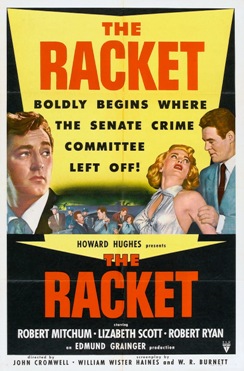Plot
The plot is very close to the original play and the 1928 movie. Racketeer and mobster Nick Scanlon has managed to buy several of the local government and law-enforcement officials of a large midwestern American city. However, he can't seem to touch the incorruptible police captain Tom McQuigg, who refuses all attempts at bribery. The city's prosecuting attorney, Welsh, and a state police detective, Turk, are crooked and make McQuigg's job as an honest officer nearly impossible. Then Higgins, a corrupted deputy prosecutor, falls victim to a mob hit.
McQuigg persuades sexy nightclub singer Irene Hayes to testify against Scanlon, which marks her for death. McQuigg not only wants to nail Scanlon, but also stop all the mob corruption in the city – without getting himself or his witness killed. A bomb explodes near McQuigg's home, frightening his wife, Mary.
Honest cop Bob Johnson is helpful to McQuigg, as is reporter Dave Ames, who has a romantic interest in Irene. At the police precinct one night, Scanlon walks in alone demanding to see Irene, who is being held in protective custody, and kills Johnson in a fight. After a car chase, Scanlon is arrested. McQuigg ignores the gangster's lawyer, ripping up his writ of habeas corpus. McQuigg has the gun that killed Johnson, which has Scanlon's fingerprints on it.
Welsh and Turk make a phone call to Scanlon's unseen mob boss for instructions. They end up telling Scanlon he must remain locked up until after the next election, angering the gangster, who threatens to tell all. Welsh and Turk then gesture toward a window and silently coax Scanlon to make a run for it.
Scanlon gets his hands on the murder weapon, but it's been emptied of bullets by McQuigg, who had foreseen everything Scanlon would try. Scanlon is shot dead by Turk, who is taken into a room with Welsh by investigators bringing subpoenas.
Irene leaves with Dave, indicating her interest in him. McQuigg goes home with his wife after a long day, aware that tomorrow will probably be just as busy.
Reception
New York Times critic Bosley Crowther panned the film. He wrote, "In this consummation, however, the conflict of cop and crook is conspicuously unoriginal, considering the number of times that it has been contemplated on the screen since The Racket was first produced, and the staging of it, under the direction of John Cromwell, is dismally uninspired. Furthermore, the construction of the screen play by W. R. Burnett and William Wister Haines is so badly disordered toward the finish that it is almost impossible to perceive the intricacies of the planning by which the cop lures the crook to his doom. As a consequence, the collision of Mr. Mitchum and Mr. Ryan is a pretty dull one, in this instance marked mainly by exchanges of clichés, and the rest of the cast does little to add life to the activities." [4]
Variety magazine, on the other hand, gave the film a positive review, "This remake of Bartlett Cormack's old play has been handled to emphasize clearcut action and suspense and the casting is just right to stress the rough and ready toughness in the script ... Further masculine attention is gained through the strong work of William Talman as a rookie cop ... Development is enlivened with some solid thriller sequences, such as a rooftop fight between Mitchum and a gunman, careening autos and crashes, and gunplay between the forces of good and evil." [5]
Writing recently, critic Dennis Schwartz was disappointed with the film, writing, "... this film didn't have enough punch to be hard-hitting, as it softened all the things about widespread city corruption and made all the characters into one-dimensional types. All it had going were the action scenes and some gloss, as the original version was a much more effective film ... The film is more reflective of the 1920s than the 1940s, unfortunately it's set in the '40s. This is a typical gangster film of that era but is dated and too murky." [6]
On the review aggregator website Rotten Tomatoes , 30% of 10 critics' reviews are positive. [7]
This page is based on this
Wikipedia article Text is available under the
CC BY-SA 4.0 license; additional terms may apply.
Images, videos and audio are available under their respective licenses.
